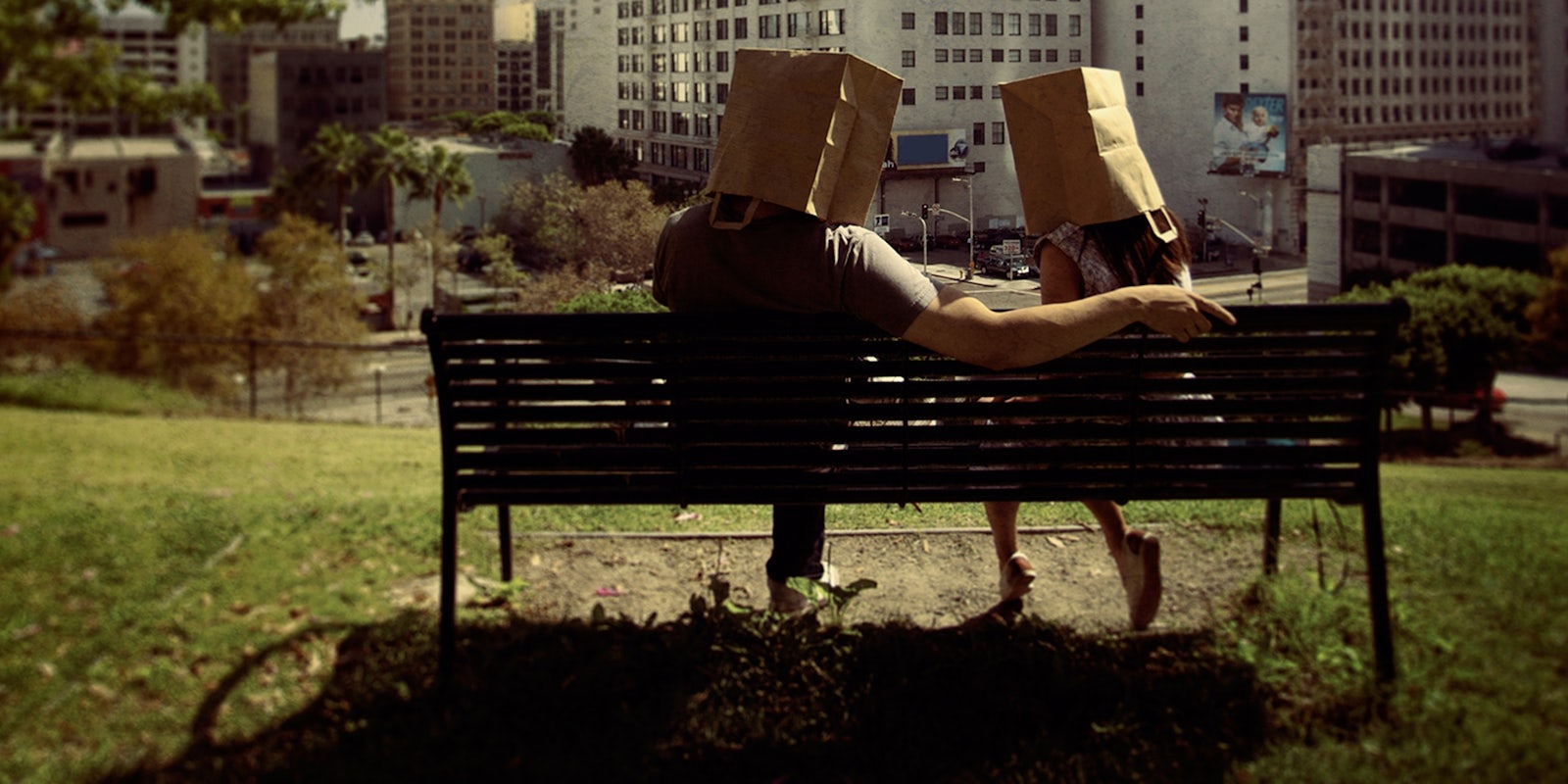It’s an undeniable fact that the world of digital dating is extremely superficial. So many dating apps these days require users to not just showcase their personalities with quippy one-line bios, but to brush up on their selfie-taking skills, so they can highlight their most beautiful selves. One app, however, wants us to do the exact opposite.
Loveflutter, a self-proclaimed ‘anti-Tinder’ dating app, is challenging the mass glorification of selfies by rebranding Valentine’s Day as #AntiSelfieDay. The app’s developers want users to go a whole 24 hours without posting a single self-portrait. Instead, users are encouraged to change their social media profile photos to a photo of themselves with paper bags over their heads, with the hashtag #AntiSelfieDay.
Proud #AntiSelfieDay Support From @Grazia_Live @janeGRAZIA @cocker_too @jessie_vee We Spy @KimKardashian #MostGuilty pic.twitter.com/aFsSMuIGR4
— Daigo Smith (@daigo_smith) February 11, 2015
“We’re conveying a serious message in a fun way,” David Standen, Loveflutter co-founder, explains to the Daily Dot. “For those fed up [with] Tinder tiger-selfies and Instagram ab-reveals, it’s a chance to prove you’re more than just good looks.”
In addition to widespread promotion of #AntiSelfieDay, Loveflutter is also organizing #AntiValentine ‘paper bag’ dating events in London and New York.
While image-based apps like Tinder are enormously popular with online daters, they’re hardly a guarantee for lasting love. An independent study that surveyed 80 Tinder users revealed that nearly half (45%) of Tinder users “never” or “rarely” meet anyone from the app, while 2 out of 3 (67%) see Tinder as “something fun to pass the time” or “an experiment.”
Since Valentine’s Day will likely be one of Tinder’s busiest days for single people, Loveflutter co-founder Daigo Smith says it seemed like a good time to push for change in the dating space.
While he predicts “newsfeeds will certainly be jam-packed with selfies” during Valentine’s Day weekend, the holiday is also “a day for all those singles out there (who number, most probably, in the millions) who haven’t found that someone special from using the app-de-jour Tinder to take a stand against superficial-swiping or dating-by-selfies,” he says.
It’s unclear if Loveflutter’s public stance against selfies is a genuine move for less superficiality in the dating space, or a brazen PR grab on one of the most popular days of the year for dating apps. But it does prompt the question: Are there really that many people angered by the popularity of the selfie?
Over the past few years, there’s been something of a selfie backlash, with many arguing that the selfie trend indulges our most narcissistic impulses. A 2013 Facebook study explored how posting selfies on social media can affect our IRL relationships, and the results are a bit disheartening.
“Our research found that those who frequently post photographs on Facebook risk damaging real-life relationships,” Dr David Houghton, a lecturer in marketing at Birmingham Business School and the lead author of the report, wrote.
“This is because people, other than very close friends and relatives, don’t seem to relate well to those who constantly share photos of themselves.”
In the Philippines, home of the most selfie-obsessed city in the world, legislators actually proposed what the local media referred to as the “anti-selfie bill,” which holds people liable for intrusion of privacy if they take a selfie that has an unwitting stranger in the background. And in New York, museums are instituting bans on using selfie sticks, claiming they are a threat to the preservation of the works on display.
The fight against the selfie craze is thriving on the web as well. On Reddit, there’s a popular thread—with more than 36,000 readers—dedicated to beautiful girls intentionally taking ugly photos of themselves. There’s also a song disparaging the trend and a short film that comically illustrates how celebrities actually feel when you ask to take a selfie with them.
While these selfie parodies are intended to be light-hearted, an anti-selfie revolution may serve an even bigger purpose in the dating world, which is currently over-saturated with image-based, swipe-based apps like Tinder. Such apps force users to make split-second decisions about matches based solely on their looks, which doesn’t bode well for the dating market.
Smith says his personal dating experiences have opened his eyes to tons of fun new ways to meet people—besides Loveflutter’s paper bag dating events, he’s tried pheromone dating, dating in the dark, and silent speed-dating, among other things.
“It’s these innovative ways to get people breaking the ice, through humor or novelty, which are taking dating in a good direction,” he says. If Loveflutter’s anti-selfie revolution takes root, we’ll be exploring these methods more often IRL—and we won’t need duck-faced or ab-flashing mirror selfies to help us along the way.
Photo via mark sebastian/Flickr (CC BY 2.0) | Remix by Jason Reed


